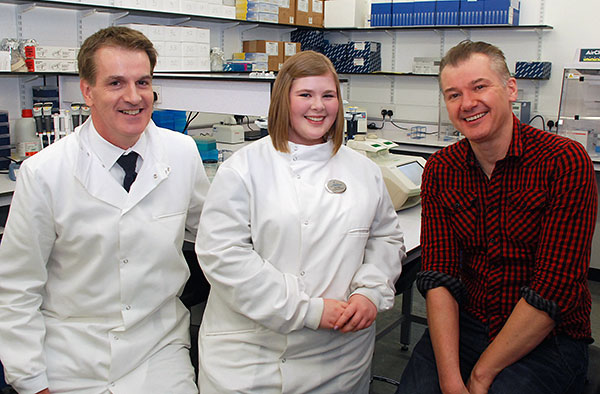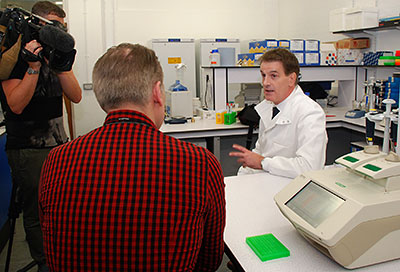Super Rats - the story behind the story
 Zoe Hollis pictured with Dr Dougie Clarke (left) and ITV journalist Chris Choi
Zoe Hollis pictured with Dr Dougie Clarke (left) and ITV journalist Chris Choi
Fri, 27 Jun 2014 13:12:00 BST
Biochemistry student Zoe Hollis has been at the heart of Dr Dougie Clarke's research into mutant rats
Dr Dougie Clarke’s pioneering work identifying how mutant poison resistant “super rats” have spread through the UK has been widely reported in the press, on radio and on television. But while Dougie has been in front of the cameras and microphones, much of the laboratory work behind the scenes was carried out by placement student Zoe Hollis.
Zoe, a third year Biochemistry student, is undertaking her placement year in Dougie’s research group, and has spent a lot of her time working with tissue samples provided by pest control professionals around the country. It’s not a job for the squeamish – Zoe has become used to receiving rats’ tails through the post, from which she extracts the DNA and uses PCR and gel electrophoresis techniques to prepare the sample to be sequenced. Once she receives the DNA sequence for each rat, any genetic mutations can be identified.
These genetic tests have shown that rats across many counties of Britain have genetic mutations which make them immune to commonly available anticoagulant poisons such as bromadiolone and difenacoum. The results of this valuable research will inform policy makers at government level in October 2014 when they decide on whether to allow the use of stronger rodenticides or to limit the use of anticoagulant rodenticides due to their potential to cause secondary poison to wildlife.
The work Zoe has been doing in the laboratory has given her valuable practical experience applying the theory she learned about on her course. “On the course you learn the theory behind it, and in one of the modules you get the chance to do a gel, but most of the actual techniques I’ve learned on the placement itself,” she said.
 One of the highlights of Zoe’s placement was being involved in a ITV documentary program “Rise of the Super Rat” for the ITV Tonight program including meeting the presenter Chris Choi in June 2014. The ITV team had filmed a rat in Oxford and sent a tissue sample to Huddersfield for analysis. Zoe said “I enjoyed the experience of meeting a famous broadcaster and film crew. The ITV team were really lovely!”.
One of the highlights of Zoe’s placement was being involved in a ITV documentary program “Rise of the Super Rat” for the ITV Tonight program including meeting the presenter Chris Choi in June 2014. The ITV team had filmed a rat in Oxford and sent a tissue sample to Huddersfield for analysis. Zoe said “I enjoyed the experience of meeting a famous broadcaster and film crew. The ITV team were really lovely!”.
TV deadlines meant that Zoe had to process the samples much more quickly than normal, as well as preparing maps and other data for the broadcasters. She was also filmed in the lab, but sadly her scenes didn’t make the final edit. Zoe commented “I was completely cut out, not even a hand!” But she is proud of her involvement in the programme: “The first ever resistant rat to be shown on TV. That’s quite significant really. I tested it and it was resistant.”
Dr Clarke commented “Zoe has been an excellent placement student and worked a project that has real life importance for public health and government policies. It is an example of the type of third year placement our students work on that gives them the edge when applying for jobs and PhDs at the end of their degree studies here."
When her placement ends later this summer, Zoe will return to her course and says she is looking forward to her final year project, hopefully in a similar area to the work she has done on placement. “I’d like to do this type of thing, but maybe learn a few more techniques as well. I’d really like to do a PhD eventually.”







